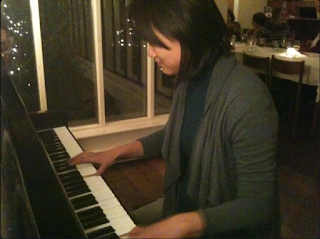The Enemy of the Good is the Better
I wrote this in February 2015. Ironically, considering the content of the piece, I was waiting until I could make it better before I published it here. We set the best traps for ourselves. Here it is in July 2016, pretty much untouched. Because really, it should just have been published when it was written.
***

Not the piano in Möckmühl, but there aren't that many pictures of me on the piano so this is the one I could find.
Lydia has a piano at her little farm house in Möckmühl. I haven’t touched a piano properly, or with the right motivation since I sold my digital piano in Montreal over two years ago.
I am not a great piano player. I never have been. I had good technique, because that can be trained, but I had little natural affinity for the instrument. When I was young, I didn’t believe in playing ‘simplified’ versions of pieces. Even though they were obviously easier to play, and thus I didn’t have to focus so much, and could actually enjoy myself more, I always held in my mind the ‘advanced’ version while I was playing the easy one, and would contemptuously make comparisons in my head. Judging the easier version as ‘baby-ish’, too simple, or only for stunted players.
To the me back then, it was embarrassing to play for others the simplified version. It seemed pathetic, like that was all I was able to do. (Even when it actually was all that I could do).
At that time, it seemed like there was more merit in practicing a complicated version of something, and not being able to perform it ‘just yet’, than there was in performing for others a simplified version well. I would secretly play the simplified version to myself when I was alone, just to reassure myself that at least I was able to do that, when the complicated version was proving too difficult for me.
I was not able to accept my limitations as a piano player at that time. My young ego was too fragile to consider the notion that I could actually not be good at something I was working so hard on. I kept thinking that if only I trained harder, or was smarter about it, or figured out the right way to learn the piece, or if I punished myself enough (and there are lots of ways that musicians can invent to punish themselves) that it would be the key to pushing myself through from mediocrity to excellence. As if my mind was the teacher with the bamboo rod, and my body the disobedient child who just wouldn’t do it right. If I could have recorded the things I would say to myself out loud while I was practicing, it would have sounded like someone with a split personality on tape. Abusing, abusing, abusing.
I hated myself for not being able to do what I thought I should have been. I verbally beat myself every time something didn’t go right, somehow believing this was the only way to motivate myself to do better. Being compassionate to myself seemed like the flabby way out. Seemed like it would just make me weak, or give me excuses to not be better. I didn’t understand then that compassion does not give you excuses for not doing well, but allows you to be yourself while still pursuing excellence. Compassion does not say ‘Oh well, this is not for everyone, why don’t you just give up. At least you’re good at math.’ Rather, it says ‘You’re trying very hard. These things take time, and sometimes you have to try for a long time, and many different ways to get there. Keep trying, and know that you are bound to improve. Relax.’
Trying to keep up appearances that of being a better player than I actually was in that moment prevented me from enjoying what I wasable to do, and prevented me from sharing that with others. The mirage of something better, more impressive, more crowd-pleasing always crowded out the possibility that the simplified version could actually be good on its own. It never occurred to me that people could actually just enjoy music no matter how simple it was.
It was better then at that time, to have my skill as a pianist unverified, unexperienced by others, remaining a mystery, than to display that maybe I was not as good as they might have imagined.
Image was everything then. And not surprising, coming from an Asian community where children were pitted against each other in competitions to bring pride to their families. Whenever I would perform, it would only be a piece that was technically difficult, but not something that had soul. I didn’t know what soul was back then. I thought skill lay in how machine-like you could train your fingers to be. Expressiveness was foreign to me. Too threatening. Why would I let anyone glimpse into me to see what I was feeling inside? What if they laughed at what they saw? What if they destroyed what I had inside?
*
More than fifteen years later, I find myself at a farm in a hamlet in Baden-Württemberg, with an old, surprisingly in-tune piano. Now the simplified version is certainly all that I can play, for the technique I had beaten so ferociously into myself when I was young had over the years all but fallen away. All that was left was the soul of the piece. And me.



